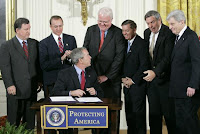Ik was er eigenlijk helemaal niet voor bestemd.
 Na het lyceum studeerde ik geschiedenis aan de Universiteit van Amsterdam. Ik bewonderde Presser, de super-leraar die dinsdagsmiddags volle zalen trok met onovertroffen nostalgische colleges over Duitse, Franse cultuur. Hij zegde "Goethe" met de lippen getuit. Ik zal het nooit vergeten. (Foto: Jacques Presser, 1965, het jaar van de publicatie van 'Ondergang' - de eerste ware geschiedenis van de Joodse Shoah in Nederland)
Na het lyceum studeerde ik geschiedenis aan de Universiteit van Amsterdam. Ik bewonderde Presser, de super-leraar die dinsdagsmiddags volle zalen trok met onovertroffen nostalgische colleges over Duitse, Franse cultuur. Hij zegde "Goethe" met de lippen getuit. Ik zal het nooit vergeten. (Foto: Jacques Presser, 1965, het jaar van de publicatie van 'Ondergang' - de eerste ware geschiedenis van de Joodse Shoah in Nederland)
Sociaal-economische geschiedenis kregen we van Jansma. Presser's tegenvoeter in stijl. Droger kun je het niet krijgen. "L'Agriculture et le Commerce sont les deux mamelles de la France," riep Jansma herhaaldelijk uit, de colbertisten citerend. Typerend voor de preutsheid van die tijd (1960), voor de persoon en voor het toen al dalende peil van de kennis van het Frans onder Nederlandse lyceïsten, was, dat de man, monkelend en blozend, weigerde om in het openbaar uit te leggen, wat "mamelles" waren. Dat moest je thuis maar in het woordenboek opzoeken.
Verder herinner ik me er niet veel van. Toch was Jansma's vak datgene wat ik wilde. Leren uit de geschiedenis van sociale emancipatie, om in het heden des te beter te begrijpen en de gehoorzame maatschappij van de vijftiger- en de zestiger jaren te revolutionneren.
Activisme
Ik kon niet wachten, tot de mamelles van Jansma ten gronde waren beschreven. Veel, te veel, van mijn tijd besteedde ik aan het veroveren van een plek in de contemporaine geschiedenis van de emancipatie, van jongeren, van studenten, van vrouwen, van de Derde Wereld en van vergeten marxistische varianten.
Elders* beschreef en beschrijf ik, wat er toen gebeurde
- met de SOK (Socialistische Ontmoetings Kernen in het Jeugd- en Jongeren Centrum 'Ruimte'),
- met de Democratich-Socialistische Studenten Vereniging Politeia en
- de oprichting, met Ton Regtien, van de Studentenvakbeweging in 1963,
- de solidariteit met de 3e wereld (Zuid-Afrika, Algerije, Vietnam),
- en de entristische** variant van de trotskistische 4e Internationale (Michel Pablo [Raptis]), waarin ik in 1960 was terechtgekomen.
Kortom, etwas sadder and wiser, liet ik de zestiger jaren achter me als archief***- en ervarings-deskundige op het gebied van arbeidersemancipatie, van de emancipatie van jongeren, van studenten en van de 3e Wereld en als een min of meer bekend (in Nederland althans) politiek dier. Het entrisme had ik afgezworen, na in 1965 in Cuba te zijn geweest en te hebben gezien, dat er niets gaat boven recht-door-zee en Che-Guevaristisch zeggen-wat je-denkt. De Studentenvak-beweging had me daarop voorbereid. Deelname aan mei-1968 in Parijs en aan de universiteitsbezettingen in Nederland (1969, Maagdenhuis) bevestigde een en ander****.
Amsterdamse gemeenteraad
Zo kwam het, dat begin-1970 de ex-communistische (SWP-) vleugel van de Pacifistisch-Socialistische Partij (PSP) me vroeg, om mei-1970 de lijst te trekken voor de gemeenteraadsverkiezingen in Amsterdam. Ik dacht, dat gemeenteraadslid een politieke functie was. Ik bereidde me voor op wereldschokkende beginseldebatten. Maar een Nederlandse gemeenteraad, zelfs, of juist die van een grote stad als Amsterdam, is vooral een college van bestuur, van beheer, van zelf-beheer. Ideologische verschillen vallen gemakkelijk weg tegenover kwaliteiten als eerlijkheid, betrokkenheid en solidariteit. Met antirevolutionaire- (de AR bestond nog in 1970) en echt-liberale collega-raadsleden voelde ik me vaak beter thuis dan met PvdAers of Kabouters (Roel van Duyn) bij wie het carrièremakersgehalte en het hadjememaar-gehalte vaak heel hoog lag.
In Nederland was, zeker toen nog, de potentiële rol van de gekozen gemeenteraad en de uit zijn midden afgevaardigde wethouders een heel grote. Ik zeg "potentieel", want heel veel van de raadsleden buitten dat niet uit. Ik, in m'n éénmansfractie voor de PSP, deed dat wel. Je had ècht direkte invloed op wat er in de stad gebeurde, hoe de ambtenaren werkten. Voortdurend werd je op je verantwoordelijkheid aangesproken. Het was mogelijk om nieuwe- en creatieve verbanden te leggen tussen politieke doelstellingen en idealen en heel concrete zaken als de toedeling van uitkeringen van de Algemene Bijstands Wet, de arbeidsomstandigheden van brandweerlieden en van taxichauffeurs, wat er in theaters en concertzalen werd geprogrammeerd en - heel belangrijk: hoe de sociale- en economische belangen van bewoners van stadsvernieuwingswijken konden worden gewaarborgd.
Sociale Stadsvernieuwing: Weesperzijdestrook
Ik beschouw als het hoogtepunt in mijn gemeenteraadscarrière de motie van 16 februari 1972, waarin achterbakse urbanistische beslissingen in de Weesperzijdestrook aan de kaak werden gesteld, regels werden gesteld aan de woningverbetering daar en hoofdlijnen aangegeven voor de ontwikkeling van die wijk door middel van aansluiting op de metro-lijn in-uitvoering, het waterfront aan de Amstel en de vernieuwing van het industriegebiedje ten Zuiden daarvan, de Omval.

(Weesperzijde, hoek Ruijschstraat in Amsterdam, gezien vanaf de brug over de Amstel, 1972)
De motie was opgesteld samen met de toenmalige "aktiegroep" Weesperzijdestrook, waarvan de kern werd gevormd door een enkele jaren daarvoor in de wijk terechtgekomen, uitgespeelde, toneelgroep. (Toneelmensen zijn volgens mij de beste "opbouwwerkers": ze geven zich helemaal, zonder achtergedachten, aan emancipatoire uitdrukkingsvormen, professioneel begeleide creativiteit, van mensen in achterstandssituaties.) Maar... de aktiegroep was niet tevreden: de speculaties van Philips-Pensioenfonds en de lokate onroerd-goed-tycoons Caransa en Van der Meyden (Ajax) waren onvoldoende aan de kaak gesteld. Vanuit hun gezichtspunt hadden ze gelijk. Maar politiek was het onmogelijk, om iets anders te doen dan wat ik heb gedaan: een (grote) raadsmeerderheid verenigen achter een beslissing, die verdere speculaties onmogelijk maakte en een perspectief bood aan de ontwikkeling van het stadsdeel. Het was een beslissende mijlpaal op de weg naar sociale stadsvernieuwing en de verwerping van steriele urbanistische concepten, zoals die op dat moment nog in de Bijlmermeer gestalte kregen.
Wie nu door de buurt loopt, ziet dat mijn interventie succes heeft gehad: woongebouwen zijn opgeknapt binnen het stratenpatroon, lelijke kantoorgebouwen zijn of worden ofwel afgebroken, ofwel omgezet in kleinschaliger voorzieningen voor startende bedrijven en de Omval kent een bouwwoede die duizenden arbeidsplaatsen genereert bij Philips (hoofdkantoor) en diverse andere instituten (Hogeschool Amsterdam, enz.).

Weesperzijde met Omval in plm. 2005. Links woningwetbouw uit de vijftiger jaren, eerder bestemd om te verdwijnen en te worden vervangen door kantoren. Nu is het zichtbare woongebouw direct aan de Amstel gerenoveerd en de woonkwaliteit is in overeenstemming gebracht met de prachtige locatie. De drie woongebouwen erachter zijn ook gerenoveerd en hebben hun functie als betaalbare huurappartementen behouden. Op de Omval, rechts op de foto, is al in de zeventiger jaren hoogbouw gerealiseerd voor de Postbank. Die werd later overgenomen door de Hogeschool Amsterdam, een combinatie van hogere beroepsopleidingen. In de negentiger jaren zijn de beide "wolkenkrabbers" van Philips (nieuw hoofdkantoor) en de andere toren gebouwd, samen met een serie "stadsvillas": dure particuliere bouw, maar toch een nuttige woonfunctie binnen de stad, waar ook behoefte aan is. De woon- en (goedkope-) bedrijven- en atelier-functies in de strook langs de Amstel ten Noorden hiervan (naar links op de foto), zijn door het raadsbesluit van 1972, en de daarop gevolgde decentrale stadsvernieuwingsactie, behouden en versterkt. (Ga naar 'Flickr' voor een panoramisch beeld vanaf de Berlagebrug over de Amstel).
Sociale Stadsvernieuwing: Buurtaanpak
Op het door mij geïntroduceerde Weesperzijde-strook-besluit volgden dergelijke besluiten over de Jordaan en over de Dapperbuurt. De eerste was voor sloop/nieuwbouw bestemd en het fijnmazige zeventiende-eeuwse woon- en atelier-weefsel leek ten dode gedoemd. De tweede was bestemd (zonder desbetreffend besluit van de gemeenteraad) voor delocatie van de universiteit. In beide gevallen nam ik deel aan, of het initiatief tot- moties van de gemeenteraad die dergelijke ontwikkelingen stopten en de weg openden naar een socialere vorm van stadsvernieuwing. In beide gevallen ook, waren de lokale aktievoerders ontevreden, en eisten meer. Wat niet wegneemt, dat in alledrie de buurten, toen de besluiten eenmaal genomen waren, lokale aktievoerders aktief hebben meegewerkt aan de fasen die daarop volgden: woningvernieuwingsplannen, verkeerscirculatieplannen, plannen to behoud en versterking van de economische bedrijvigheid.

(Amsterdam, September 1975: Pas verlozen wethouder van Verkeer, openbaar vervoer, personeel en kunst).
Sociale Stadsvernieuwing past binnen een democratisch bestel
Wie er ook niets van moesten hebben, waren mijn oude vrienden uit de revolutionnaire bewegingen. Een onbewuste keuze voor wat de Duitsers noemen 'Verelendungspolitik' lag daar, naar mijn mening, aan ten grondslag. Immers, waar zelfbeherende perspectieven werden geboden aan de gemarginaliseerde en wanhopige groepen, leek de revolutie terug te wijken. "Reformisme", ongeveer het ergste wat je doen kon, werd me verweten.
Ik geloofde (en geloof) daar nog steeds absoluut niets van: Mensen die de middelen krijgen om (meer) hun eigen lot in handen te nemen, die verantwoordelijkheid kunnen nemen voor de emancipatie van hun buren en verwanten door middel van scholing, nieuwe bedrijvigheid, behoud van bestaande bedrijvigheid, fusie van kennis en kunde, zijn per definitie revolutionnairder dan gemarginaliseerde- en op zichzelf teruggeworpen bevolkingen.
Een krampachtig instandgehouden etnische scheiding (wantrouwen), sexuele scheiding (vrouwen in traditionele rollen) en leeftijdsscheiding (jongeren van werk weerhouden, ouderen niet meer serieus genomen), bevordert juist populistische perversies van de wil tot verzet en afwijzing van bestaande machtsstructuren. Wie nieuwe macht creëert, zal die ook gebruiken ten eigen voordeel. En dat is, in het geval van mensen die ontmacht zijn, een goede en essentiële zaak. Het kan me niet schelen, dat zo een wijze van machtsherverdeling kan plaatsvinden binnen de bestaande democratische structuren. Zolang dat nog kan, zijn de voordelen van de bestaande politieke democratie te verkiezen boven autoritaire avonturen.
Noten:
*) "Elders": Een voorlopige versie van m'n politieke Werdegang eind-vijftiger-, begin-zestiger jaren is te vinden bij Geert Mak (Europa), bij wie ik als "getuige" optreed van die epoche. Mijn oorspronkelijke tekst uit 2002, waarvan grote delen door Mak letterlijk worden geciteerd, wordt binnenkort hier gepubliceerd (huibs.net).
**) Entrisme: Een meerderheids- later een minderheids-, tendens van de 4e Internationale (de Trotskistische variant van de Komintern, opgericht in 1938 door Leon Trotsky zelf), verkoos "onder te duiken" in de massabeweging, waarvan de ideologische inhoud sterk kon variëren al naargelang het betrokken land. In Frankrijk was dat lange tijd de PCF, in Engeland Labour, in Nederland PvdA en NVV, maar in Argentinië kon dat bij voorbeeld de Peronistische massabeweging zijn en in Afrika diverse guerrilla-bewegingen. Het entrisme is verklaarbaar uit de repressie (tot en met gerichte moorden) die in het laatste deel van het Stalin-tijdperk werd uitgeoefend tegen opposanten als de trotskisten. Met de komst van de "dooi" onder Chroesjtsjev begon deze praktijk al minder relevant te worden. Ze is echter nog lang doorgegaan en heeft geen goed gedaan aan de waarden die door de volgelingen van Trotsky werden uitgedragen, noch aan de moraal van de betrokkenen. Deze laatsten muteerden óf tot bureaucraten van de massabewegingen die zij infiltreerden, óf "schoten door" naar conservatieve opvattingen (de Amerikaanse "neocons" hebben ook trotskistische wortels), óf, zoals in het geval van de Nederlandse Trotskisten, trokken zich terug op een sectarisch eilandje, dat in de zeventiger jaren langzaam maar zeker wegzonk.
***) Archief: Van 1961 to 1971 werkte ik aan het Internationaal Instituut voor Sociale Geschiedenis in Amsterdam als wetenschappelijk ambtenaar. Ik hielp met de verwerving van archieven, maakte ze toegankelijk voor onderzoek, ordende brochure-collecties en publiceerde enkele wetenschappelijke artikelen gebaseerd op archief-onderzoek. "Moderne" archieven (vanaf eind-negentiende eeuw) vereisen een andere aanpak dan die uit vroegere tijden. Enerzijds is de papieren nalatenschap veel te groot om traditioneel te worden geordend, anderzijds ontbreekt essentiëel materiaal, waar de telefoon haar intrede heeft gedaan: meer en meer werden belangrijke zaken telefonisch afgedaan, waardoor de papieren nalatenschap devalueert. Mijn remedie bestond uit registratie van interviews met overlevende acteurs en uit reconstructie van de archiefstructuur van de betrokken organisaties en personen, waardoor veel arbeidstijd bespaard kan worden en de toegankelijkheid minstens zo goed behouden blijft.
****) Mei-'68, Maagdenhuis-'69: Nog uit te werken in een volgend deel van mijn herinneringen, hier te publiceren.
 Huib
Huib  04-05-2007 | in
04-05-2007 | in  2007,
2007,  Defense and Security,
Defense and Security,  International Policy,
International Policy,  Iraq,
Iraq,  Italy,
Italy,  Netherlands,
Netherlands,  Poland,
Poland,  Spain,
Spain,  UK,
UK,  USA,
USA,  [EN]
[EN]  Olmert with his Patron...
Olmert with his Patron...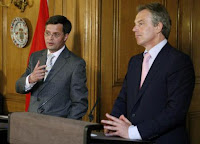 Blair with Balkenende, April 2007: Both will have to step down, sooner or later, because of their alliances with Bush.
Blair with Balkenende, April 2007: Both will have to step down, sooner or later, because of their alliances with Bush.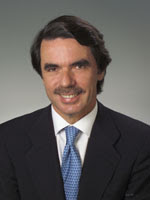 José Aznar, staunch supporter of Bush. Was ousted as PM in Spain in 2004, after lying about the background of the 11/3 terrorist murders in Madrid. Is now a featured speaker of the Washington Speakers Bureau.
José Aznar, staunch supporter of Bush. Was ousted as PM in Spain in 2004, after lying about the background of the 11/3 terrorist murders in Madrid. Is now a featured speaker of the Washington Speakers Bureau. Silvio Berlusconi, Italian Prime Minister. Was outraged as he was NOT invited to the Madeira conference in March 2003. A top secret agent of the Italian SS was killed by American soldiers in 2005. His distancing from the US afterwards did not help him: He lost the 2005 elections to Prodi, who retired all Italian military from Iraq.
Silvio Berlusconi, Italian Prime Minister. Was outraged as he was NOT invited to the Madeira conference in March 2003. A top secret agent of the Italian SS was killed by American soldiers in 2005. His distancing from the US afterwards did not help him: He lost the 2005 elections to Prodi, who retired all Italian military from Iraq.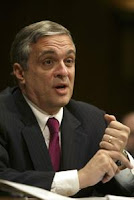 Tenet, former CIA director, who took his distance from Bush and Cheney recently, writing a book.
Tenet, former CIA director, who took his distance from Bush and Cheney recently, writing a book.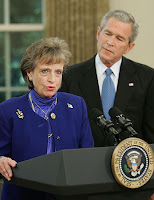 My favored portrait of Miers and Bush, announcing her candidature for the Court. Bush, just after his election for a second term, was confident, that he could do anything he wanted. Poor Miers was his first victim then.
My favored portrait of Miers and Bush, announcing her candidature for the Court. Bush, just after his election for a second term, was confident, that he could do anything he wanted. Poor Miers was his first victim then. Bolton - another victim of Bush' hubris. We are waiting for HIS version of what happened. His neocon friends at the Weekly Standard already let Bush' handling of Iraq and the Middle East down. What is he going to say for himself?
Bolton - another victim of Bush' hubris. We are waiting for HIS version of what happened. His neocon friends at the Weekly Standard already let Bush' handling of Iraq and the Middle East down. What is he going to say for himself?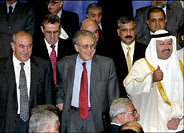 Allawi with friends, 2004, in the provisional authority of Iraq, at the signature of the new Iraqi Constitution ceremony.
Allawi with friends, 2004, in the provisional authority of Iraq, at the signature of the new Iraqi Constitution ceremony. Achmad Chalabi, master intriguer, who, as an Iranian agent, bedeviled all NeoCons in Washington. Was to become the first president of American Iraq, but ousted, when the Pentagon, who paid for his non-existent movement, discovered the truth in April 2003. Was offered a prominent seat behind president Bush when he gave his State of the Union in January 2004. His ties to the Mollahs were discovered, and, spring 2004, his offices raided by American troops. At this moment, he is biding his time, somewhere behind the screen of Grand Mollah Sistani.
Achmad Chalabi, master intriguer, who, as an Iranian agent, bedeviled all NeoCons in Washington. Was to become the first president of American Iraq, but ousted, when the Pentagon, who paid for his non-existent movement, discovered the truth in April 2003. Was offered a prominent seat behind president Bush when he gave his State of the Union in January 2004. His ties to the Mollahs were discovered, and, spring 2004, his offices raided by American troops. At this moment, he is biding his time, somewhere behind the screen of Grand Mollah Sistani.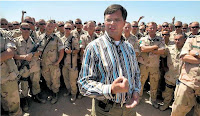 Balkenende with Dutch military in Afghanistan, 2006.
Balkenende with Dutch military in Afghanistan, 2006.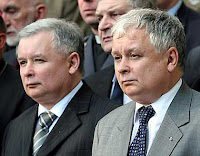 The twin Polish president and PM - next victims?
The twin Polish president and PM - next victims?
 [EN]
[EN] [FR]
[FR] [DE]
[DE]


